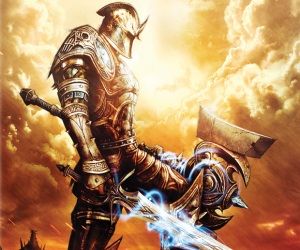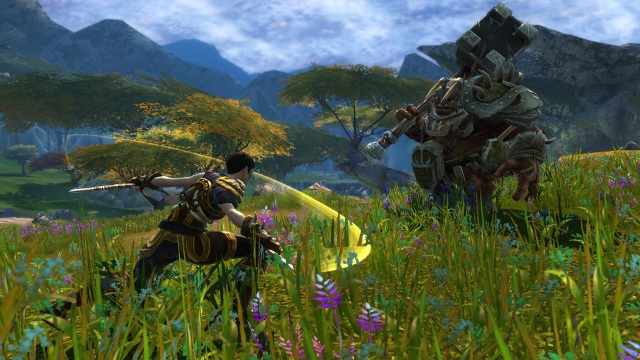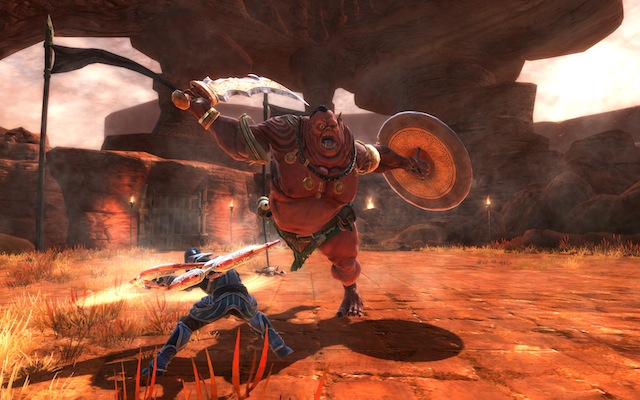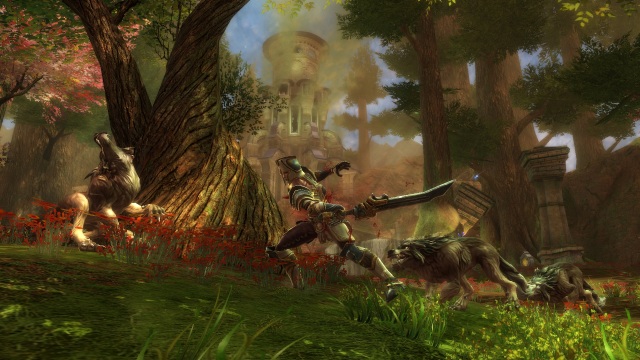Kingdoms of Amalur: Reckoning Review
 Game: Kingdoms of Amalur: Reckoning
Game: Kingdoms of Amalur: Reckoning
Developer: 38 Studios & Big Huge Games
Publisher: Electronic Arts
Available On: Xbox 360, PlayStation 3, Windows PC (Reviewed on Windows PC)
As an RPG fan, the games that originally had me taking gaming seriously were the likes of Breath of Fire 4 and the original Golden Sun games. I’d spend hours trawling through their huge landscapes, and being absolutely blown away by the storylines that they presented.
It’s in these games that we find the perfect equation for the RPG format, one that anyone attempting an RPG these days should definitely take into consideration. Grasping my self acclaimed RPG expertise firmly, I had a fantastic time applying it to the latest huge RPG to hit our shelves; Kingdoms of Amalur: Reckoning (hereby shortened as KoA because ‘Kingdoms of Amalur: Reckoning’ is a damn long title!).
The most interesting part of KoA’s development is that it was originally set out to be an MMORPG, which definitely shows through the gameplay, with towns acting as quest hubs and dungeons dotted around, filled with treasure waiting for you to plunder their depths, but was the transition to a single player game quite the success they had hoped for?

STORY: Reckoning is classic story telling at it’s very best. The game takes a traditional stab at a ground that hasn’t been tampered with too much: Fate. You start the game dead. Fantastic, right? However the Well of Souls, despite having failed countless times before, resurrects you, allowing you to escape from the horrid dungeon in which it’s contained, which also happens to currently be being raided and destroyed by a relentless army; the Tuatha Deohn.
Escaping, you meet with a Fateweaver, who proceeds to tell you that the world is run by fate. Every being has their fate already written, and must follow that path. Intrigued, you ask for him to read your fate and upon trying, he claims that you have none. The usual ethereal threads that make a person’s fate are there, but are all loose and moving, meaning you are able to create your own fate.
Suddenly, you’re jumped by goons from the Tuatha. In a heated battle you unleash a power that gives you the ability to change the fate of those you are fighting. Upon killing them, the Fateweaver claims that you possess the power of the Gods, as they are the only ones who can change the fate of mortal beings.
Confused, and slightly perplexed, you set off on a journey to try to discover what you actually are, helping out townspeople and following whatever path you choose ties in well with the RPG mainframe that companies seem to be going about these days; of creating your own adventure.

Each character you stop to talk to will unveil a little bit of their own part in that world, and the choice is yours as to whether you want to involve yourself in that story, or to pass on and focus on yourself. Each options gives its own rewards, and it’s up to you to mould the world around you to exactly how you want.
This interesting play with Fate allows for this model to really take form within KoA. Past games ask you to create your own adventure despite anchoring you down with a character with back history or extra luggage, however from KoA’s starting line you’re told you and your future is yours to create. Nothing holds you back from following the paths you want to follow or submitting to the will of others.
GRAPHICS: With the developers of the Rise of Nations series of games (Big Huge Games) being involved with KoA, it’s no surprise that there are some tweaks to the formula that really make the game stand out from the crowd. While the usual aspects are included, with sword swinging and magical combat making you feel powerful, all of this is executed in a game with a distinct style.
What that style is proves difficult to place a finger on. With an element of reality definitely embedded somewhere in amongst the engine, the game also carries a subtle cartoon influence that creates a perfect mixture and portrays an interesting and artistic game which is an absolute pleasure for the eyes.

Whilst the visuals don’t delve into the waters of Skyrim, attempting to blow your mind around every corner, the awe is still there, which quickly entrances you in a deceivingly believable world. To this extent, it’s very strengths is one of its weaknesses, as it became incredibly easy to get complacent with what KoA was offering. After a bit of time had passed, the game had sucked me in so much that the detail of rocks and plant life went unnoticed.
However if you keep reminding yourself it’s there, you’ll continue to witness a rich world that does keep giving.
SOUND: Previously a very undervalued part of the game development cycle, it’s now one of the most important, and can possibly be the deciding factor on whether or not your game is an enthralling success, or an annoying earache. However KoA shot that possibility dead by getting Grant Kirkhope in on the action.
Being known for creating amazing scores for fun, platforming titles such as Banjo Kazooie and Viva Piñata, Kirkhope has taken his hand to the fantasy epic area and hasn’t failed in the slightest. With creepy dungeon music that makes the hairs on your neck stick up to pleasant field roaming lullabies that make you wish you had a frolic button.
Other aspects of the game leave a bit to be desired, unfortunately. Battle Combat is incredibly predictable, and whilst there isn’t a lot to build on from the current model, it doesn’t do anything to enhance the combat system they designed specifically for this game. Similarly, the voice acting throughout the game can instantly change from utterly convincing to cringe worthy. Characters will pour their souls out in conversation (or try to, at least) and I found myself choosing quests based on who I actually believed, and whose voice just annoyed me. Many of us have yet to find a game in which all the voice acting is 100% spot on, and KoA doesn’t break that chain, unfortunately.

GAMEPLAY: And now we get to where KoA really shines. The game has, for a while now, been running with the promise of its incredibly involving combat system. And it doesn’t fail to bring the goods. Fighting in KoA can literally be completely up to you, sticking primarily to swords and daggers, or mixing a bit of magic and archery into the mix. With a simple roll assigned to the space bar (or ‘B’ button if you’re playing on the Xbox, Circle on the PlayStation 3), being able to get in and out of battle whilst throwing swings is beautifully satisfying, yet not perfect.
Every now and then you’ll want to roll in one direction and instead trundle straight towards an incoming threat, however, with practice, this won’t be a problem, and the fantastic fluid movements will make up for it ten times over.
What I found the best about this interesting combat system is that fighting with magic is a genuine choice, rather than something you have to endure and practice at, usually abusing some sort of game flaw to actually pull of effectively. No, KoA allows magic users to get into the heat of battle and hold their own. Of course, if you chose the Mage route, you’ll end up much squishier than the armour enhanced tank, but the challenge is in skill instead of a battle between fair and unfair.
Unfortunately, the new combat system is possibly the only fresh thing to the game. Hidden among the combat, which they throw at you immediately, lies a very stagnant RPG model, with sub standard questing, dungeon exploring and story trudging.
Reckoning doesn’t defile the genre by making these aspects bad, but it obviously didn’t pay nearly as much attention to them as it should of done, and as such, removing the combat will have you playing a game you’ve seen time and time again. The quests are World of Warcraft style ‘collect-5-of-this’ quests, and the rewards aren’t exactly inspiring.
You’ll find yourself levelling up and collecting EXP just like you’ve done hundreds of times before, and gaining that level will soon lose its interest when the system of levelling up is almost a cut and copy of what we’ve seen before, choosing your proficiencies and skills in either sword swinging, magic flinging and arrow pinging.

LONGEVITY: Reckoning never promised it was going to change the genre. It did promise a new battle system, which it brought and then some, but the rest of the game is what any RPG fan will be used to. As such, you’ll find yourself playing the game through to the very end, whether that’s a 20 hour run through the story line or a 100 hour marathon through all of the side quests, which is easily doable. Reckoning won’t leave you hanging with a short game and nothing to do afterwards.
Give it the chance and the game will take you through people’s stories that become engaging and will have you genuinely hooked, wanting to know exactly what happens to Barry No-one, despite the fact he meant nothing to you a mere 20 minutes ago; and that’s just the first play through. Lacking the Skyrim “Swap-styles-whenever-you-want” model, you may find yourself wanting to play through the game as an archer, or a different race once you’ve gone through it the first time, both of which will open up different aspects of the game that were previously locked.
VERDICT: Kingdoms of Amalur: Reckoning is a game blatantly made for fans of the RPG genre and is unforgiving if you aren’t completely familiar with what the genre has to offer. It brings all aspects of it full force, unrelenting in its forwardness. Looking over the sections where the game falls short, none of them are actually things wrong with the game. The battle system and storyline idea regarding fate are just so well thought out and planned that the rest of the game looks puny in comparison, even though they’re solid RPG elements.
Kingdoms of Amalur: Reckoning won’t define the genre. It may define parts of the genre, but overall it slots nicely in with the big hitters in the same category without making much of a big deal, and for fans of those particular areas, that’s more than enough to keep you returning to the wonderful game.

Rik Wortman
When he’s not writing up a storm at his desk, he’s playing games like Minecraft, Skyrim, Portal, World of Warcraft, Pokemon…well, the list goes on. He studied English and Creative writing at university, which is where he honed his skills for making the gaming news come alive, with a few terrible typos along the way for good measure. Fret not though, my friend, for he does tell quite an engaging tale with each article, and has had plenty of practice, having written for This Is My Joystick and 3DSBuzz.
In between articles he likes to indulge in one of his addictions: Twitter. @Wortermelon provides a good dose of gold on occasion, and other times leaves you wondering why you’re following such a huge weirdo.



